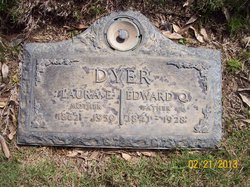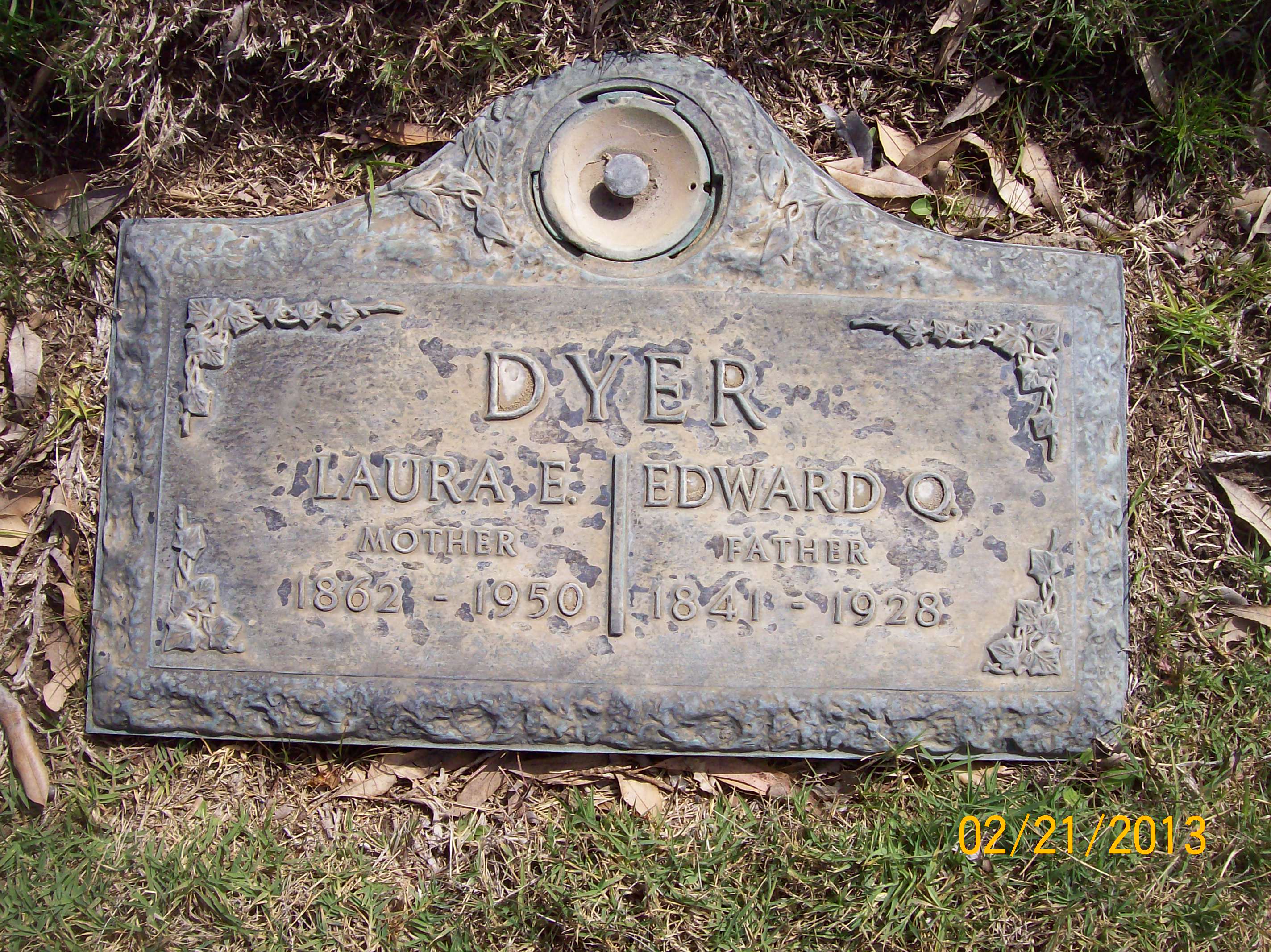EDWARD QUINCY DYER. Since May, 1912, Edward Quincy Dyer has lived in Nestor upon a beautiful fifteen acre fruit ranch, where he is residing in comparative retirement, resting after a long, active and honorable career. For a number of years he was a dominating figure in state politics of Massachusetts, his native state, and well known in business circles of Boston. Throughout his entire career he has given his time and energies to lasting, beneficial and worthy things and has left the impress of his upright and forceful personality upon the business and political history of a great commonwealth. He was born in Charlestown, Massachusetts, in October, 1841, and is a son of Quincy and Josephine (Soule) Dyer, natives of Maine. Edward Q. Dyer acquired his education in the public schools of Boston and after he laid aside his books engaged in the clothing business in Boston for twenty years and afterward was for eighteen years in the hardware business. During this time he became widely and favorably known as a keen, farsighted and progressive business man who was always interested and active in the pro- motion of those enterprises which directly influence and hasten public growth and development. As a result he was carried forward into important relations with public affairs and in order to make his ability and progressive spirit more generally effective entered the political field, where he soon made his influence felt in a vital way. From 1898 to 1902 he was a member of the board of selectmen of Hyde Park, Massachusetts, and then turned his attention to state politics. He was elected to the Massachusetts legislature in 1902 and in the two terms during which he held office was a member of the mercantile committee, serving as its chairman in 1903. It was during his period of activity in this position that the subway bill was passed, under the provisions of which a subway beneath the city of Boston was constructed. Mr. Dyer's official career was dis- tinguished by energetic, able and conscientious work along lines of public improvement and expansion, by careful consideration of the interests of his constituents and by a keen sense of his responsibilities and obligations as a public servant. He remained in Massachusetts until 1905 and then came west, locating in Seattle, Washington. He there engaged in the real-estate business and still owns valuable property, although he left the state in 1912. In that year he settled in Nestor, California, and purchased the Hall lemon ranch of fifteen acres, on Palm avenue. However, Mr. Dyer does not specialize in raising lemons, having a number of acres planted in oranges, apricots, peaches, plums, tangerines, loquats, figs and apples. He has been very successful in the cultivation of the latter fruit and recently picked from a small tree one apple which weighed one and one-half pounds. Mr. Dyer takes a great interest in the further develop- 324 HISTORY OF SAN DIEGO COUNTY ment of this property and is giving a great deal of his time and attention to it with gratifying results. Mr. Dyer has been twice married. His first union was with Miss Mary S. Marshall, a native of Plattsburg, New York, who passed away leaving two children. The elder, Fred M., is a member of the firm of N. W. Halsey & Company of New York. He owns a beautiful one thousand acre estate near Closeter, New Jersey, which he conducts as a fancy stock farm. He married Miss Frances Sweet, a native of Hyde Park, Massachusetts, and they have three children. The other child born to Mr. Dyer's first marriage is a daughter, Josephine M. After the death of his first wife Mr. Dyer wedded Miss Laura Marshall and they have become the parents of two sons, Edwin L. and Louis Quincy. The latter recently passed the examination before the California state board of optometries, in Los Angeles, with a mark of ninety-six, the second highest ever given by the board. Edwin is also a student at Los Angeles. Mr. Dyer has extensive fraternal relations, being affiliated with the Forest Lodge, I. O. O. F., and Monterey Encampment. He belongs to the Knights of Pythias in Hyde Park, Massachusetts, and is a member of Riverside Lodge, A. O. U. W. He is also prominent in the Masonic order, holding membership in the lodge, chapter and commandery and being also affiliated with the Order of the Eastern Star and the Rebekahs. His life has been in all its relations upright, useful and straightforward, distinguished by high integrity in official service and honorable dealing in all business and private capacities. No phase of his activity, however, is more honorable than his service in the American Navy during the Civil war. At the outbreak of hostilities, in 1861, he offered his services and was mustered on board the frigate Colorado. He was later transferred to the sloop of war Pensicola and was in the thick of the battle at New Orleans. He was mustered out with honorable discharge on the 30th of June, 1862, after fourteen months of active service. Mr. Dyer keeps in touch with his comrades of fifty years ago through his membership in the Grand Army of the Republic, belonging to Timothy Ingraham Post, No. 121, of Hyde Park. In the days of peace his activities have been directed by the same fearlessness and loyalty which marked his service in his country's defense, and he is in all things an upright and honorable gentleman as well as a valorous soldier.
EDWARD QUINCY DYER. Since May, 1912, Edward Quincy Dyer has lived in Nestor upon a beautiful fifteen acre fruit ranch, where he is residing in comparative retirement, resting after a long, active and honorable career. For a number of years he was a dominating figure in state politics of Massachusetts, his native state, and well known in business circles of Boston. Throughout his entire career he has given his time and energies to lasting, beneficial and worthy things and has left the impress of his upright and forceful personality upon the business and political history of a great commonwealth. He was born in Charlestown, Massachusetts, in October, 1841, and is a son of Quincy and Josephine (Soule) Dyer, natives of Maine. Edward Q. Dyer acquired his education in the public schools of Boston and after he laid aside his books engaged in the clothing business in Boston for twenty years and afterward was for eighteen years in the hardware business. During this time he became widely and favorably known as a keen, farsighted and progressive business man who was always interested and active in the pro- motion of those enterprises which directly influence and hasten public growth and development. As a result he was carried forward into important relations with public affairs and in order to make his ability and progressive spirit more generally effective entered the political field, where he soon made his influence felt in a vital way. From 1898 to 1902 he was a member of the board of selectmen of Hyde Park, Massachusetts, and then turned his attention to state politics. He was elected to the Massachusetts legislature in 1902 and in the two terms during which he held office was a member of the mercantile committee, serving as its chairman in 1903. It was during his period of activity in this position that the subway bill was passed, under the provisions of which a subway beneath the city of Boston was constructed. Mr. Dyer's official career was dis- tinguished by energetic, able and conscientious work along lines of public improvement and expansion, by careful consideration of the interests of his constituents and by a keen sense of his responsibilities and obligations as a public servant. He remained in Massachusetts until 1905 and then came west, locating in Seattle, Washington. He there engaged in the real-estate business and still owns valuable property, although he left the state in 1912. In that year he settled in Nestor, California, and purchased the Hall lemon ranch of fifteen acres, on Palm avenue. However, Mr. Dyer does not specialize in raising lemons, having a number of acres planted in oranges, apricots, peaches, plums, tangerines, loquats, figs and apples. He has been very successful in the cultivation of the latter fruit and recently picked from a small tree one apple which weighed one and one-half pounds. Mr. Dyer takes a great interest in the further develop- 324 HISTORY OF SAN DIEGO COUNTY ment of this property and is giving a great deal of his time and attention to it with gratifying results. Mr. Dyer has been twice married. His first union was with Miss Mary S. Marshall, a native of Plattsburg, New York, who passed away leaving two children. The elder, Fred M., is a member of the firm of N. W. Halsey & Company of New York. He owns a beautiful one thousand acre estate near Closeter, New Jersey, which he conducts as a fancy stock farm. He married Miss Frances Sweet, a native of Hyde Park, Massachusetts, and they have three children. The other child born to Mr. Dyer's first marriage is a daughter, Josephine M. After the death of his first wife Mr. Dyer wedded Miss Laura Marshall and they have become the parents of two sons, Edwin L. and Louis Quincy. The latter recently passed the examination before the California state board of optometries, in Los Angeles, with a mark of ninety-six, the second highest ever given by the board. Edwin is also a student at Los Angeles. Mr. Dyer has extensive fraternal relations, being affiliated with the Forest Lodge, I. O. O. F., and Monterey Encampment. He belongs to the Knights of Pythias in Hyde Park, Massachusetts, and is a member of Riverside Lodge, A. O. U. W. He is also prominent in the Masonic order, holding membership in the lodge, chapter and commandery and being also affiliated with the Order of the Eastern Star and the Rebekahs. His life has been in all its relations upright, useful and straightforward, distinguished by high integrity in official service and honorable dealing in all business and private capacities. No phase of his activity, however, is more honorable than his service in the American Navy during the Civil war. At the outbreak of hostilities, in 1861, he offered his services and was mustered on board the frigate Colorado. He was later transferred to the sloop of war Pensicola and was in the thick of the battle at New Orleans. He was mustered out with honorable discharge on the 30th of June, 1862, after fourteen months of active service. Mr. Dyer keeps in touch with his comrades of fifty years ago through his membership in the Grand Army of the Republic, belonging to Timothy Ingraham Post, No. 121, of Hyde Park. In the days of peace his activities have been directed by the same fearlessness and loyalty which marked his service in his country's defense, and he is in all things an upright and honorable gentleman as well as a valorous soldier.
Family Members
Sponsored by Ancestry
Advertisement
Advertisement











